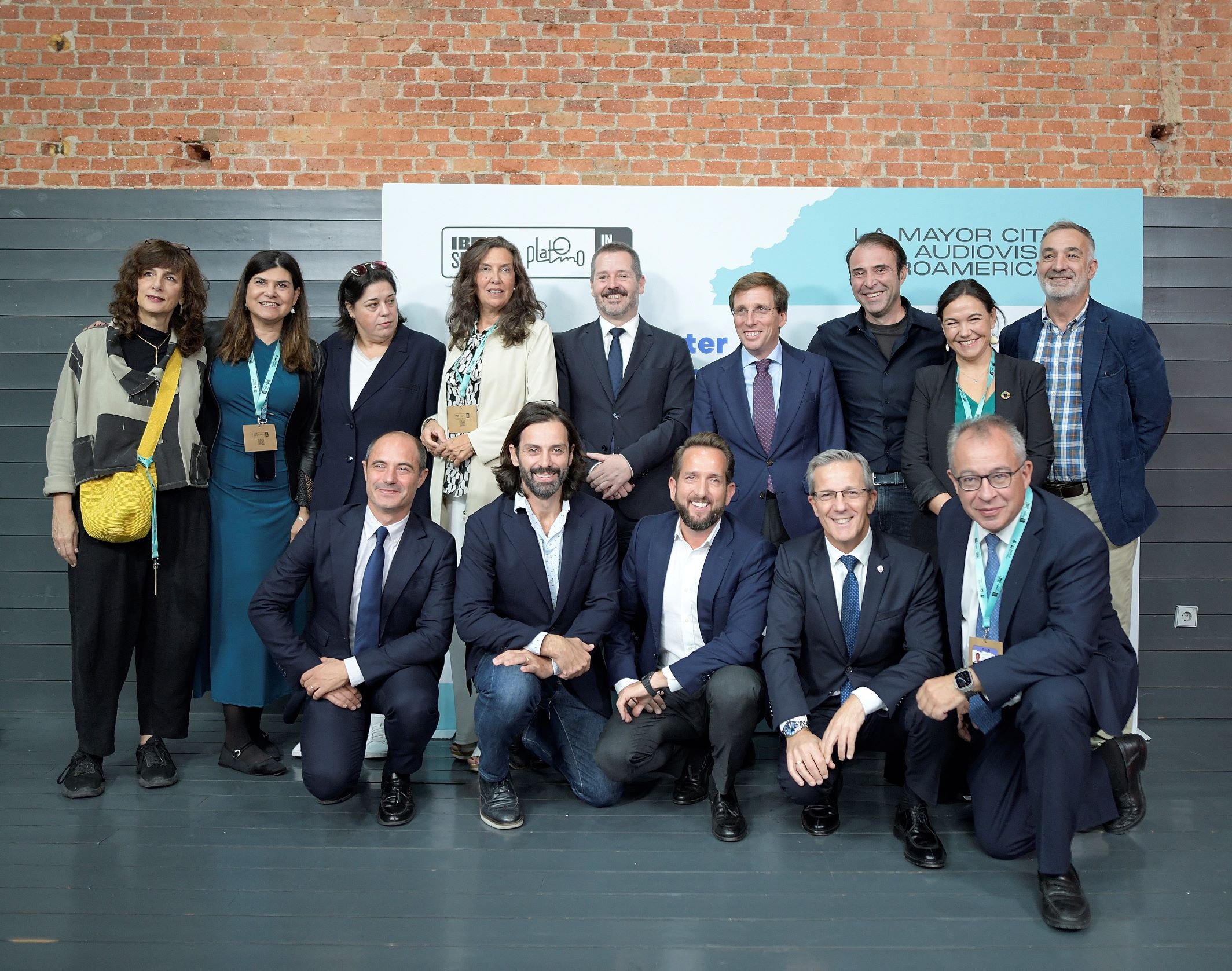In an effort to strengthen the audiovisual and entertainment industry in the region, the Madrid Audiovisual Cluster was officially presented yesterday during the inaugural day of Iberseries & Platinum Industry at Matadero Madrid.
This innovative ecosystem brings together key players in the sector in a framework of collaboration and development.
The ceremony was attended by prominent representatives, including Raúl Berdonés, President of the Cluster; Mariano de Paco, Minister of Culture, Tourism and Sport of the Community of Madrid; and José Luis Martínez-Almeida, Mayor of Madrid City Council, who emphasised the importance of this initiative for the future of the industry in the capital.
Martínez-Almeida stressed that ‘the Madrid Audiovisual Cluster is allowing us to articulate and organise the audiovisual sector by involving everyone, and to create synergies of talent, knowledge, information and entrepreneurship to generate a more powerful industry’.
Mariano de Paco pointed out that ‘the Cluster is the essential instrument for the companies that make up the backbone of the audiovisual sector, a sector in constant evolution. I am especially proud of the collaboration with the Cluster, supporting one of the economic pillars of the region’.
Raúl Berdonés underlined that ‘the Madrid Audiovisual Cluster was born with a clear vision: to transform the audiovisual industry through innovation and cooperation. Our mission is to bring together key players in the sector to foster sustainable growth, promote competitiveness and make Madrid an international benchmark in this field. With the support of 76 entities, we are driving a new era for the industry, where digitalisation and sustainability are fundamental pillars’.
The Madrid Audiovisual Cluster is a private initiative that is a true innovation engine and is supported by the public. Its mission is to bring together diverse organisations that seek to transform the audiovisual industry in Madrid, promoting real and sustainable change that benefits all stakeholders.
El Clúster reúne a un diverso grupo de entidades que abarcan toda la cadena de valor de la industria audiovisual, incluyendo asociaciones relevantes del sector (PATE, AECINE, APPA, APCP, ALIA, AEVOD, ADICINE, PROXIMA, UTECA, FEDICINE, Federación de Cines de España, así como AMA y Matriz en Madrid); empresas clave (productoras como Tornasol, Izen, Globomedia, Mediacrest y Secuoya Studios, entre otras), junto a empresas tecnológicas punteras como Telefónica, Paramotion y las que conforman Pixel; plataformas de streaming (Netflix, Amazon, Disney y Movistar); instituciones académicas (Universidad Complutense, Universidad de Alcalá y Universidad Rey Juan Carlos, además de escuelas de cine como ECAM, UTAD y The Core); entidades (EGEDA, SGAE y Dama), así como bancos y despachos de abogados como Caixabank, Triodos Bank, Andersen y Ecija) y empresas de servicios especializados (The Film Agency, Mrs Greenfilm y OMMA), hasta un total de 76 agentes destacados del sector.
Fostering innovation and competitiveness
The Madrid Cluster has been created with a common goal: to foster innovation and competitiveness in the audiovisual sector. Through cohesion between existing companies, the promotion of new initiatives and the boosting of international projection, the aim is to make Madrid a benchmark in the audiovisual field.
To carry out this ambitious mission, twelve working groups have been established to define the Cluster’s strategy and prioritise the most relevant actions. Current initiatives include: the creation of a portfolio of services that provide value to members, as well as the attraction of new companies and entities interested in joining this ecosystem and contributing to the development of the sector.
The Madrid Audiovisual Cluster has been conceived as a platform that promotes cooperation and development in the audiovisual sector, acting as a meeting point between companies, associations and academic institutions. Through its network, innovation events will be organised and meeting spaces will be created to promote the exchange of knowledge and experiences between the actors in the sector. The cluster will also offer specific tools to improve competitiveness, supporting companies in their digitalisation processes and fostering the creation of innovative projects that strengthen the industry’s value chain.
In addition, an Audiovisual Observatory will be set up in Madrid, which will allow the current state of the industry to be analysed and understood, including data on consumption and audience. With a focus on social responsibility, progress will be made in practices that minimise the environmental impact of the sector, encouraging changes towards more sustainable production. With these initiatives, the Madrid Cluster seeks not only to strengthen the local industry, but also to position it in an international context as a benchmark for innovation and quality.
Author: Víctor Guerra
BRANDOMINUS



